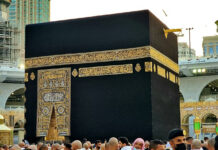By Ahmad Muazu
THE cost of Hajj has risen globally generating billions of dollars.
Until the introduction of modern transportation system, most Muslims beyond the Arab world had little expectation of making this vital Islamic obligation
Before the mid 1950’s the number of international pilgrims rarely exceeded 100,000 and modern Saudi institutions were still developing, yet by the year 2000 the number of pilgrims had surpassed two million, reaching a peak of three million by 2012.
New opportunities for pilgrims in the jet age have put immense pressure on infrastructures, with the growing pressure the Saudi government has to invest very huge funds to improve the facilities and the overall management of Hajj. The millions who came to Makkah every year bring billion of dollars to the Saudi restaurants, airlines, hotels, travel agents, mobile operators among other numerous businesses that benefit from the Hajj
The Saudi government benefits from taxes and revenue generation from pilgrims makes up to 31% of Saudi non-oil GDP which totals around Eight billion dollars. This becomes the second source of income to the Saudi government after hydrocarbons and does not include Umrah Operations.
In 2007, umrah operations alone attracted 8 Million pilgrims which generated four billion dollars to the kingdom. The vision 2030 targets thirty million pilgrims per year. 25 to 30% of businesses in Makkah and Madina depend on pilgrims to survive (Source Makkah chamber of Commerce).
In Nigeria, there is still little data on the impact of Hajj on the Nigerian Economy making it difficult to work out the impact but so encompassing and touching on almost every aspect of the economy. The Hajj organization in this country has a spill over to various sectors and various industries.
The Saudi government allocates quotas to countries based on the international organization of Islamic cooperation agreement allowing one thousand pilgrims per million of the Muslim population in each country, although they are flexible base on circumstances a good example is the covid era.
Muslims in Nigeria are privileged as they go hajj on demand unlike those from Indonesia that although managed by government yet pilgrims have to wait for seven to twenty years or more in que for the hajj visa. The deposits are held in funds which were then used to help reduce the cost of Hajj for the pilgrims. In the UK Hajj packages average around four thousand seven hundred and fifty pounds where umrah is ten thousand and fifty, the cost has increased in recent years.
The Nigerian Hajj Market is worth trillions in Naira, while the Saudi targets hajj revenue growth to $160 billion in 2020 and $267 billion in 2030 it has so far invested almost $50 billion to boost infrastructure and transport with the aim of $150 Million coming from Hajj Sector alone and the creation of 100,000 permanent jobs for their citizens.
As Nigeria is looking towards diversification of its economy, it needs to depend less on oil, Hajj will be an avenue to explore also, as day by day the number of pilgrims demanding to make the sacrosanct journey is increasing. If the infrastructures of making the Hajj will be put in place, the spill effect will be massive as revenue generation will soar high and jobs will be created. Imagine the number of passports being done each year for the purpose of travelling to Saudi for Hajj and Umrah alone. The effect is very broad that it needs in-depth research to conclude on the final gains of the hajj industry in the Nigerian economic contribution scale.
What Does the Hajj Economics Future Look like?
With the target of 4.5million hajj pilgrims and 30 million umrah pilgrims by 2030 the Saudi reliance on the sector to increase its economic growth is very substantial.
The key challenge to Nigeria here is how to tap on this innovation and also stimulate the Hajj industry growth, as the increase of the number of pilgrims will give birth to more organizational problems. But it can be utilized as well to boost the economy in so many ways from reviving textile industries that may cater for pilgrim uniforms to other industries like aviation, food and beverages as well as other small-scale industries.
READ ALSO: Two men bag 20 strokes of cane, 30 days community service for defaming Gov Ganduje
The involvement of government in Hajj activities in Nigeria predates independence as Late Sir Ahmadu Bello made a trip to Saudi Arabia in 1955 sponsored by the northern region government that was five years before the independence and ever since that time the government has been trying to see how it can safeguard the welfare of Nigerian pilgrims and in 1958 the southern region established its pilgrims welfare management under the leadership of Chief Obafemi Awolowo, the board was established to find a lasting solution to the gamut of problems encountered by the Pilgrims.
The hajj industry has been given very special considerations since that time, from special Hajj passports down to subsidizing the fare among other numerous exceptions due to its high economic value as well as consideration by the Muslim populace.
The HSS is on a promising trajectory but the hullabaloo by states and some stakeholders is trying to slow its implementation, the necessity of giving it high degree of credibility cannot be overemphasized this will foster and improve the Hajj ecosystem,
Just like in the aviation industry booking a seat early costs less than that of the last minute, the eventuality of Nigerian pilgrims booking late is at 56% as it has become so obvious that people lack the saving habit in order to achieve the ultimate journey.
Looking at the spending power of Nigerians in the kingdom of Saudi Arabia the locals even have to learn a few dialects in order to market their products shows that Nigerians are heavy spenders when it comes to Hajj and Umrah.
The Saudi government as part of austerity measures have tripled the VAT to support its pandemic hit economy.
A more streamlined process and regulations should be encouraged as this will foster the economic growth of Nigeria and Africa as well.
The Nigerian government should plan to tilt more towards tapping the Saudi vision 2030 by encouraging more exports to Saudi just like other countries do in order to make their pilgrims feel more comfortable and also to generate revenue that will serve all Pilgrims.
Ahmad Muazu, a staff of NAHCON, writes from Abuja























